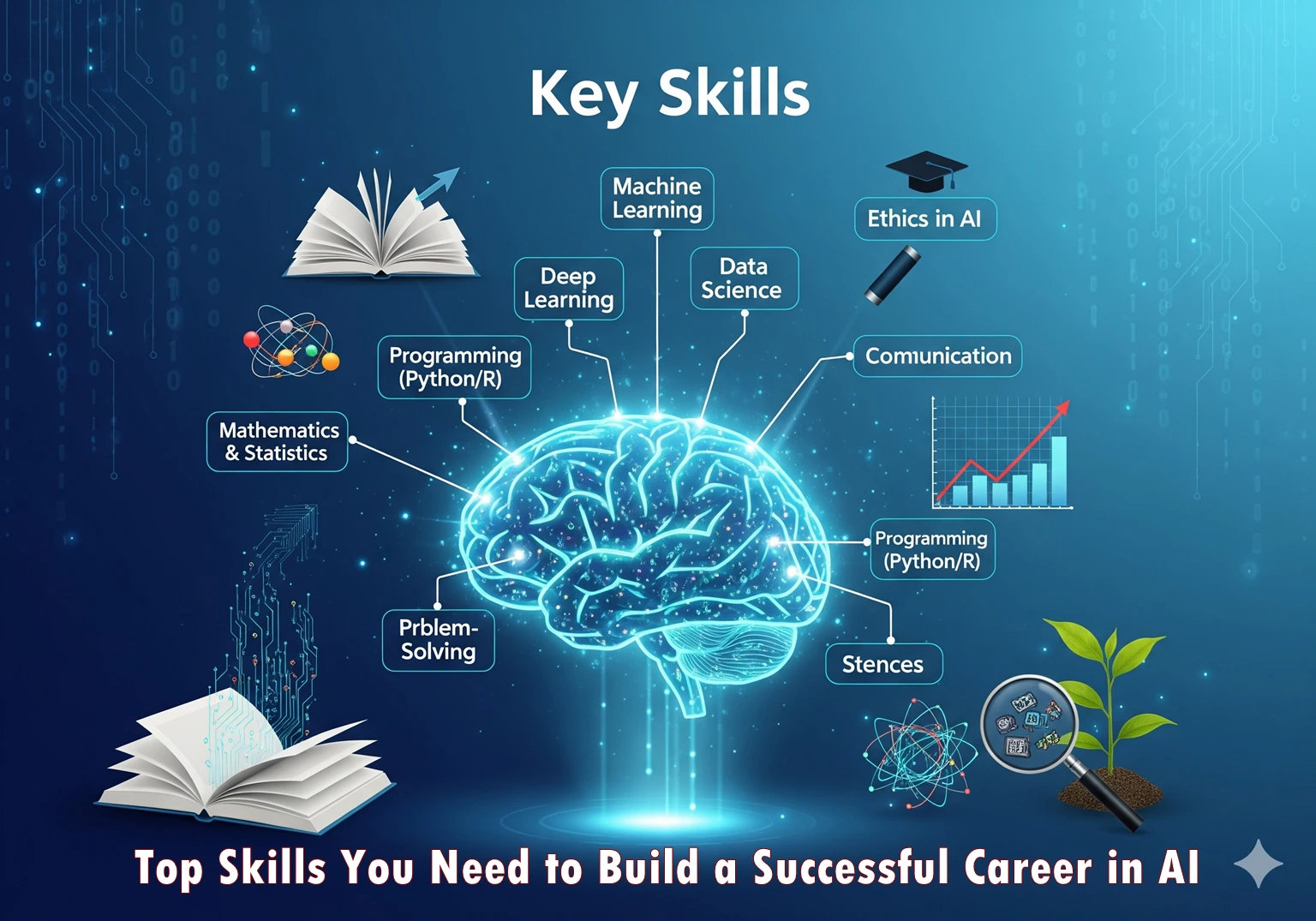Table of Contents
Introduction
Career in AI is one of the most exciting opportunities in today’s tech-driven world. An artificial intelligence career opens doors to industries such as healthcare, finance, education, and entertainment, all of which are being transformed by AI. With the rising demand for jobs in AI, professionals are actively building their AI career path to stay ahead in this fast-changing field. Whether you are exploring careers in artificial intelligence or preparing for the future of AI jobs, success depends on developing the right mix of technical knowledge and AI professional skills.
In this article, we’ll explore the top skills you need to build a successful career in AI, covering both technical and soft skills that will make you stand out in this competitive field. For related learning opportunities, check out our guide on the best online courses for career growth 2025-26.

Why Choose a Career in Artificial Intelligence?
Artificial intelligence (AI) is a gateway to the core of modern innovation. Here’s why:
- High demand: Companies across the globe are hiring AI professionals.
- Excellent salaries: AI roles are among the highest-paying jobs in technology.
- Future-proof opportunities: With automation and machine learning, AI careers will only expand in the future.
- Impactful work: AI solves real-world problems, from disease detection to climate predictions.
For more insights on AI-driven tools, visit Coursera for top-tier AI courses.
Top Technical Skills for a Career in Artificial Intelligence
1. Programming Skills
Strong programming knowledge is the foundation of a successful AI career. You should be skilled in:
- Python – the most popular programming language used for artificial intelligence and machine learning.
- R – widely used in statistical computing.
- Java, C++, and Julia – useful for performance-intensive AI applications.
2. Mathematics and Statistics
AI is powered by math. Essential areas include:
- Linear Algebra
- Probability and Statistics
- Calculus
- Optimization
Proficiency in these areas is crucial for comprehending machine learning algorithms and conducting data analysis.
3. Machine Learning and Deep Learning
A core part of AI is the ability to teach machines how to learn. You’ll need knowledge of:
- Supervised and unsupervised learning
- Neural networks
- Natural Language Processing (NLP)
- Reinforcement learning
Frameworks such as TensorFlow, PyTorch, and Keras are must-learn tools.
4. Data Science and Data Handling
AI thrives on data. Skills to master:
- Data collection and cleaning
- SQL and NoSQL databases
- Data visualization (Matplotlib, Tableau, Power BI)
- Big data tools like Hadoop and Spark
5. Cloud Computing
Most AI solutions run on the cloud. Experience with cloud platforms like AWS, Google Cloud AI, and Microsoft Azure AI is a significant asset for deploying and scaling AI models.
Top Soft Skills for a Career in Artificial Intelligence
1. Problem-Solving
AI professionals must identify problems and create intelligent solutions. Critical thinking and creativity go hand-in-hand with technical expertise.
2. Communication Skills
Explaining AI solutions to non-technical stakeholders is crucial. Clear communication ensures your ideas are understood and implemented effectively.
3. Collaboration and Teamwork
AI initiatives are highly collaborative, requiring close work with software developers, data scientists, and business analysts. Being a good team player makes you a stronger professional.
4. Continuous Learning
Since AI is evolving rapidly, successful professionals stay updated with the latest trends, research papers, and tools. A mindset of lifelong learning is essential.
Career Paths in AI
With the right skills, you can explore various roles in AI, such as:
- Machine Learning Engineer: Focused on the creation and development of AI algorithms.
- Data Scientist: Analyzes data and builds predictive models.
- AI Researcher: Works on developing cutting-edge AI technologies.
- Robotics Engineer: Builds intelligent machines and systems.
- AI Product Manager: Acts as a key liaison, translating complex AI technology into practical business solutions.
Steps to Build a Successful Career in AI
Step 1: Gain Strong Fundamentals
Start with mathematics, programming, and statistics to build a solid base.
Step 2: Learn AI Tools and Frameworks
Experiment with TensorFlow, PyTorch, and Scikit-learn through projects and online courses.
Step 3: Build Practical Experience
Work on projects like chatbots, image recognition systems, or recommendation engines to showcase your skills.
Step 4: Network and Collaborate
Join AI communities, attend webinars, and connect with professionals on LinkedIn to grow your career opportunities.
Step 5: Stay Updated
Read AI research, follow industry leaders, and continuously improve your skillset.
Common Mistakes to Avoid in an AI Career
- Focusing only on coding and ignoring math fundamentals.
- Neglecting soft skills like communication and teamwork.
- Not keeping up with rapidly changing AI trends.
- Overlooking real-world problem-solving while learning theory.
FAQs about a Career in AI
Q1: Do I need a degree to build a career in AI?
Not always. While degrees help, many professionals enter AI through online courses, certifications, and practical experience.
Q2: What is the average income for artificial intelligence?
Salaries vary by role and region, but AI engineers typically earn between $80,000 and $150,000 annually, with higher ranges for senior positions.
Q3: Is AI a good career for beginners?
Yes. AI is one of the fastest-growing fields with opportunities for beginners who are willing to learn.
Q4: How long does it take to build a career in AI?
It depends on your background. With focused learning, many people start entry-level AI roles within 1–2 years.
Q5: Which industries hire AI professionals?
AI experts are in demand in healthcare, finance, retail, education, cybersecurity, and even creative fields like media and design.
Conclusion
A career in artificial intelligence is one of the most rewarding paths in today’s technology-driven world. By mastering technical skills such as programming, machine learning, and data handling, and combining them with soft skills like communication and problem-solving, you can set yourself apart in this competitive field.
Whether you think of it as an artificial intelligence career, a career path in AI, or simply jobs in AI, the journey begins with learning, practice, and persistence. With dedication and continuous growth, you can build a successful and future-proof career in Artificial Intelligence.


